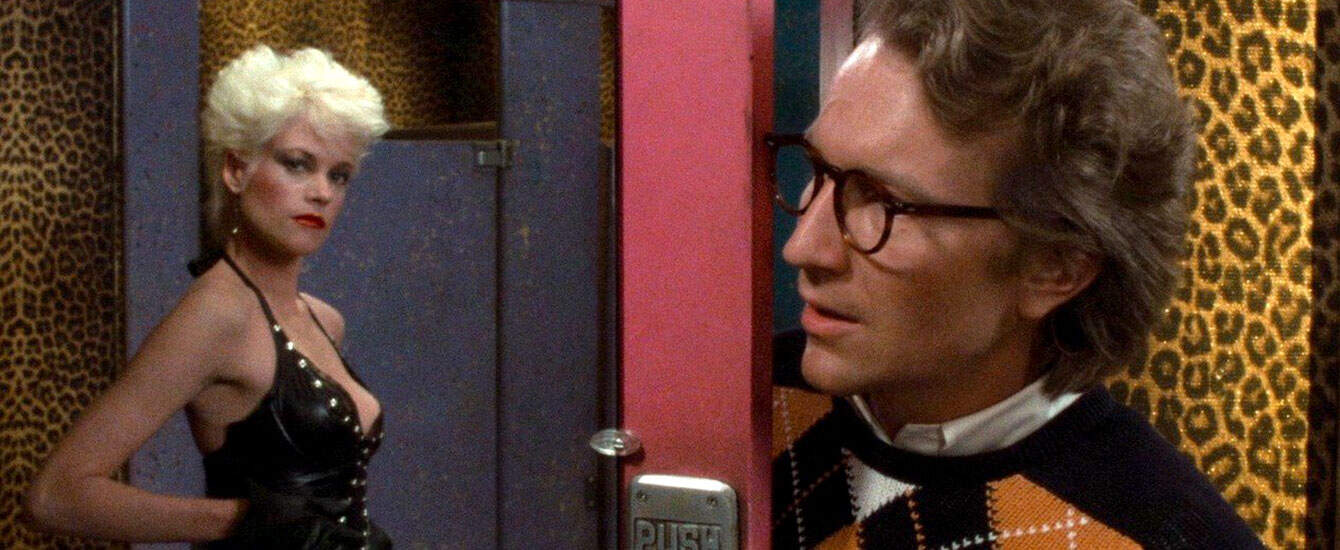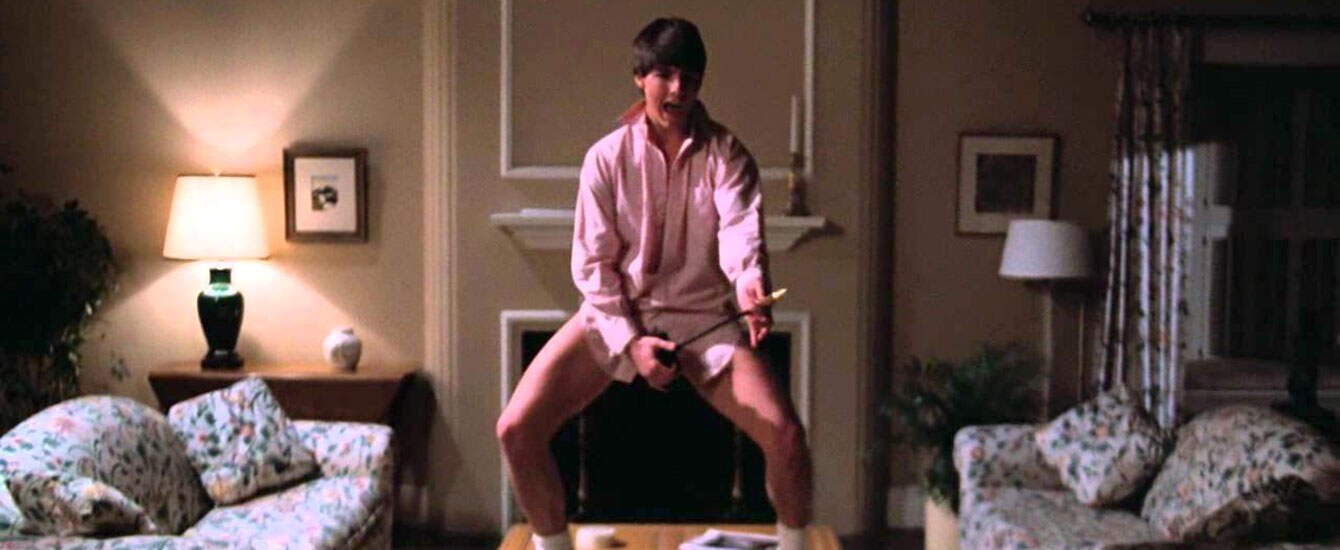“Hot Summer Nights” is a six-week retrospective showcasing nearly 30 steamy movies from the 1980s and ‘90s, back when sex was still a selling point for mainstream studio pictures. Kicking off on Monday, July 15 with Paul Schrader’s “American Gigolo” and closing on Saturday, Aug. 31 with Stanley Kubrick’s “Eyes Wide Shut,” the series celebrates a bygone era when adult situations were at the forefront of American popular culture. From the frank teenage escapades of “Risky Business” (July 22) and “Fast Times at Ridgemont High” (July 17) to boundary-breaking erotic thrillers like “Basic Instinct” (Aug. 17) and “Bound” (Aug. 26) the series has little time for taboos. While Hollywood continues serving almost exclusively family-friendly, PG-13 fodder at the multiplex these days, what’s maybe most shocking about this retrospective is how common R-rated content used to be.
“These movies were a part of the cultural conversation,” explains IFFBoston program director Nancy Campbell. “If you went to a dinner party, you were expected to have an opinion about Sharon Stone.”
Sleazy mysteries and raunchy teen comedies might seem like a stretch for an indie film festival, but the motivation behind “Hot Summer Nights” is the same as with IFFBoston’s “Sight and Sound Summer Vacation” last year, which served up a cinema history lesson on the big screen at the Somerville, showing classic films complete with introductions by local critics and film experts. “Our mission is creating literacy in terms of film viewing,” says Campbell. “This series is filling a lot of cultural gaps for us. We’re curious about where things fit in.”
“It’s interesting to think about a time when Hollywood made movies for adults,” says IFFBoston’s executive director Brian Tamm. “What does it say about the end of the 20th century and the fact that 25 years on, we’re not making movies like this anymore? Is that necessarily a good thing? I don’t know.” Tamm says he got the idea for the series while listening to film historian Karina Longworth’s essential podcast “You Must Remember This.” Her “Erotic ‘80s” and “Erotic ‘90s” seasons made him realize how few of these seminal movies he had actually seen.
“I think in the ‘80s I was too young to see these movies and in the ‘90s I felt I was too good for them,” Tamm admits. “I was kind of a d—k. Nancy’s seen them all, but she’s much more worldly than I am. Anyhow, I’m glad I waited until now, when I have a better perspective than I did at that age.”

My generation had a lot of formative moviegoing memories watching lurid delights like Lawrence Kasdan’s “Body Heat” (July 16) or Brian De Palma’s gleefully transgressive “Body Double” (July 23) on late night cable, usually with the volume turned down low so our parents wouldn’t wake up. (Last week on vacation, I told some of my film buff friends about the series. One of them asked, “Can you even show ‘Body Double’ in a theater?”) The hope is that presenting these films on the big screen at the Somerville will invite audiences to think about them as historical objects and reflect on how times have changed. “There are certainly discussions to be had,” says Tamm. “I don’t want to make a seminar out of it, but we’re hoping to get local critics to come in, like with ‘Sight and Sound Summer,’ and help put these movies into context.”
This critic will be introducing “Risky Business,” writer-director Paul Brickman’s scathing satire of Reaganomics starring Tom Cruise as an overachieving high school graduate preppie who turns his vacationing parents’ suburban McMansion into a brothel. (It makes an amusing bookend with “Eyes Wide Shut,.” in which Cruise plays a guy who literally can’t get laid at an orgy.) Other notable, seldom-screened titles include Steven Soderbergh’s zeitgeist-defining 1989 debut “Sex, Lies and Videotape” (Aug. 14) and David Cronenberg’s NC-17 “Crash” (Aug. 27) a jaw-dropping allegory about bodily mutilation fetishists which won a Special Jury Prize at the 1996 Cannes Film Festival “for originality, for daring and for audacity."

As one might expect from a retrospective featuring no fewer than six films written by Joe Eszterhas, some of the selections are, for lack of a better word, dreck. A Linda Fiorentino double feature pairs the actress’ spectacular, star-making turn in John Dahl’s “The Last Seduction” with her career-derailing appearance in William Friedkin’s abysmal, Eszterhas-scripted “Jade” (Aug. 20). “Screening these movies is not necessarily an endorsement of them or their content,” Campbell stresses. “I don’t think we have to like a movie in order to show it, and we’re not necessarily trying to reclaim these films. It’s a chance to revisit them and think about their place in the culture a little bit. I don’t think I’m going to like ‘Fatal Attraction’ more this time, but I’ll give it a try.”
“Fatal Attraction” (July 24) might be one of the most emblematic movies of the 1980s even though it’s not particularly good. Or maybe because it’s not particularly good. The film’s blunt-force, bunny-boiling crudeness is what turned it into a cultural phenomenon — recasting AIDS anxieties and misogynistic fantasies about sexually liberated career women as existential threats to hearth and home. There’s a reason star Michael Douglas (both here and in “Basic Instinct”) became the avatar of an era, daring audiences to identify with the white male privilege he wore like a suit of armor, his ability to bed beautiful starlets both a superpower and his Kryptonite.
Advertisement
“There are some deeper, thornier questions in these films that mainstream movies aren’t asking anymore,” Tamm says, lamenting that the kind of moral ambiguity on which Douglas thrived seems to have fallen out of fashion. “I think that’s gone to independent films now… showing you a person and how you judge them is more a mirror of what you are than what the movie is. I think a lot of audiences feel like films should be more clear in their intentions these days.”
“I’m curious to see the reactions of young people watching these movies for the first time,” says Campbell, acknowledging that an entire generation has grown up in a Marvel cinematic universe absent any depictions of adult sexuality onscreen. “This might be uncomfortable for them,” she laughs. “I predict a lot of blushing in the dark.”
Yet I envy these younger audiences in their ability to see these movies from a fresh perspective, decades removed from the tabloid controversies and water-cooler gossip that often overshadowed the merits of the films themselves. “'Eyes Wide Shut’ certainly has a very different reputation now than when it came out,” Tamm observes. Rumor has it critic Janet Maslin was sacked by the New York Times for her positive review of the buzzy box office bust, which — like every Kubrick picture since “Barry Lyndon” and multiple Razzie-nominee “The Shining” — was initially greeted with virulent hostility in the press, only to later be reappraised as a classic.
Back in the summer of 1999 I’d been reviewing movies professionally for exactly four months and can still recall sitting in a row of stone faces at the long-gone Nickelodeon theater for the Boston critics’ screening of “Eyes Wide Shut.” Former host of WSBK-TV 38’s “The Movie Loft” Dana Hersey and I were the only people laughing at Kubrick’s darkly comic farce about jealousy and sexual frustration, which had been misleadingly marketed as an erotic odyssey. Audiences expecting soft-core pornography instead watched the world’s biggest movie star strike out all over New York City’s sexual underworld, with “Top Gun” Cruise hilariously cast as an impotent doofus, a failed Casanova cuckolded by his (real life) wife Nicole Kidman, even in her dreams.
“For better and worse, ‘Showgirls’ also has a very different reputation these days,” teases Tamm, noting how every generation thinks they’re the first to reclaim Paul Verhoeven’s notorious 1995 nudie boondoggle as a camp classic. The film’s recent canonization by the Criterion Channel has inspired even more revisionist takes, so many that it might be about time for the pendulum to start swinging back in the direction of the initial disdain. (I recently had to shut off a podcast on which several smug young people were denigrating us dumb old fogeys for supposedly missing the film’s screamingly obvious satirical aspirations, which have been written about extensively over these past 29 years.)
“Showgirls” is being presented on Aug. 21 as part of a double feature with “You Don’t Nomi,” a terrific documentary that screened at IFFBoston in 2019. In it, filmmaker Jeffrey McHale examines the “Showgirls” conundrum from a variety of sociopolitical angles, consulting both snark artists and cinema scholars to try and get to the bottom of a movie that’s both knowing and stupid — at once smarter than you thought it was and dumber than you could possibly imagine. This uncanny ability to be both brilliant and terrible at the same time is why I refer to “Showgirls” as “Schrödinger’s skin flick.”
It's not often that you can go see a film and stay to watch a critical documentary about it, but such is the spirit of exploration and rediscovery behind this IFFBoston series. “Now that I’m older, I see things differently. I’m always hoping that when I look at a film again I’ll like it more,” says Tamm. “I don’t know that it will happen with ‘Showgirls,’ but we’ll see.”
IFFBoston’s “Hot Summer Nights” runs at the Somerville Theatre from July 15 through August 31. WBUR film critic Sean Burns will introduce the screening of “Risky Business” on July 22.
from "sexy" - Google News https://ift.tt/et6cY3R
via IFTTT
No comments:
Post a Comment